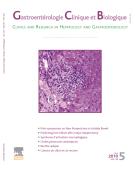Factors predictive of complicated or severe alcohol withdrawal in alcohol dependent inpatients - 18/09/08
 , M. Thomas a, P. Arvers b, D. Corberand a, L. Sinayoko a, S. Bonnefoy a, F. Harnois a, C. Thiolet a
, M. Thomas a, P. Arvers b, D. Corberand a, L. Sinayoko a, S. Bonnefoy a, F. Harnois a, C. Thiolet aSummary |
Objective |
In a department of hepatology and gastroenterology, a significant number of patients are hospitalized for alcohol withdrawal. The aim of this retrospective study was to identify factors predictive of severe or complicated alcohol withdrawal in order to improve patient management.
Methods |
Between June 2002 and June 2005, 182 patients admitted for alcohol dependence according to the DSM-IV classification were enrolled in this study. A unique management protocol for alcohol withdrawal was applied for all patients. The Cushman score was recorded on day 1, 2 and 3 to assess the severity of alcohol withdrawal. We searched for correlations between epidemiological, clinical and biological data and the Cushman score.
Result |
The study population included 136 (74.7%) men and 46 (25.3%) women, mean age 47.6±10.1years. One hundred and eighteen patients (64.8%) were referred from a specialized outpatient clinic and 64 (35.2%) patients were referred from the emergency unit. The mean and median Cushman scores on day 1, 2 and 3 were: 5.1 and 5; 3.9 and 4; 2.3 and 2, respectively. Twenty patients (11.0%) and five patients (2.7%) had scores greater than or equal to 8 and greater than 12, respectively. The proportion of patients with Cushman score greater than or equal to 8 on day 1 was significantly greater in patients referred from the emergency unit than in those referred from a specialized outpatient clinic (p=0.002). Mean alanine aminotransferase level on day 1 was significantly higher in patients with a score greater than or equal to 8 than in those who had a score less than 8 (112.1±44.4UI/L versus 78.4±11.8UI/L; p=0.046). Referral via an emergency unit as well as an alanine aminotransferase level greater than 1.5fold the upper limit of the normal range were independent predictive factors for a Cushman score greater than or equal to 8.
In conclusion, severe alcohol withdrawal (Cushman score≥8) is significantly associated with initial management in an emergency unit and serum alanine aminotransferase level greater than 1.5fold the upper limit of the normal range. These predictors should be monitored in order to appropriately adapt the therapeutic schedule.
Il testo completo di questo articolo è disponibile in PDF.Résumé |
Introduction |
Le nombre d’hospitalisations dans un service d’hépatogastroentérologie pour le sevrage d’une alcoolo-dépendance est important. Le but de cette étude, retrospective, était de déterminer les facteurs prédictifs d’un sevrage alcoolique sévère ou compliqué afin d’améliorer la prise en charge de ces malades. De juin 2002 à juin 2005, 182 malades ayant une alcoolo-dépendance selon la classification DSM-IV pris en charge dans le service pour sevrage ont été inclus dans cette étude. Tous les malades recevaient un protocole de sevrage identique. La gravité du sevrage alcoolique était évaluée par le score de Cushman à j1, j2 et j3. Les paramètres épidémiologiques et biologiques ont été comparés avec les valeurs du score de Cushman. Cent trente-six hommes (74,7 %) et 46 femmes (25,3 %) d’âge moyen 47,6±10,1ans ont été inclus. L’hospitalisation a été réalisée à partir d’une consultation d’alcoologie pour 118 malades (64,8 %) et par le biais des urgences pour 64 d’entre eux (35,2 %). La moyenne et la médiane du score de Cushman étaient à j1, j2 et j3, respectivement, de 5,1 et 5 ; 3,9 et 4 ; 2,3 et 2. Vingt malades (11,0 %) et cinq malades (2,7 %) avaient un score, respectivement, supérieur à 8 et supérieur ou égale à 12 à j1. La proportion de malades ayant un score supérieur ou égale à 8 à j1 était supérieure chez les malades venant des urgences que chez ceux issus de la consultation d’alcoologie (p=0,002). Les malades dont le score était supérieur ou égale à 8 avaient un taux sérique moyen de l’alanine aminotransférase significativement plus élevé à j1 que ceux qui avaient un score inférieur à 8 (respectivement, 112,1±44,4UI/L versus 78,4±11,8UI/L ; p=0,046). L’admission par le biais des urgences ainsi qu’un taux sérique de l’alanine aminotransférase supérieur à 1,5 fois la limite supérieure de la normale étaient les deux variables indépendantes prédictives d’un score de Cushman supérieur ou égale à 8. En conclusion, un syndrome de sevrage sévère lors d’une alcoolo-dépendance est significativement plus associé à une hospitalisation directe par le biais des urgences et à un taux sérique de l’alanine aminotransférase supérieur à 1,5 fois la limite supérieure de la normale. La présence de ces facteurs à l’admission du malade nécessite une surveillance accrue et une éventuelle adaptation de la prise en charge thérapeutique.
Il testo completo di questo articolo è disponibile in PDF.Mappa
Vol 32 - N° 8-9
P. 792-797 - Agosto-Settembre 2008 Ritorno al numeroBenvenuto su EM|consulte, il riferimento dei professionisti della salute.

